Along with building critical thinking skills and improving academic achievement, environmental education enhances connections with nature and encourages future environmental stewardship. In addition, time outdoors benefits children’s development through increased physical activity and improved mental health. With support from the Jacob and Terese Hershey Foundation, educators are ensuring that our most vulnerable youth – including those involved with the foster and justice systems and those with disabilities – are able to benefit from high-quality outdoor learning.
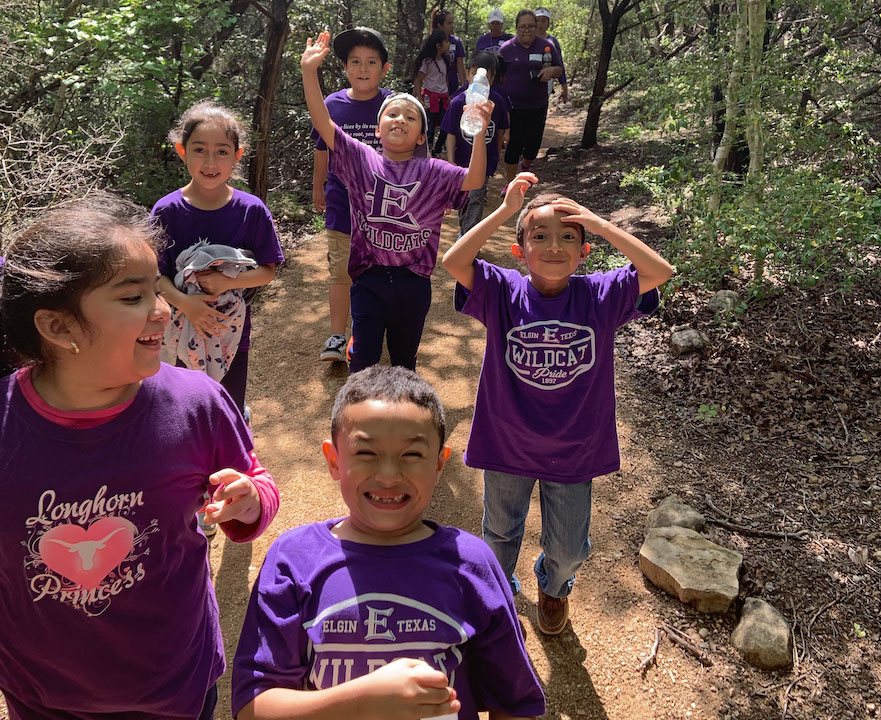
For example, through its annual PEAKS Camp, the Texas Network for Youth Services facilitates meaningful connections to nature for youth involved in the child welfare system. Taking a personalized approach, TNOYS collaborates with these youth and young adults, including previous PEAKS campers, to ensure that the camp curricula and associated outdoor activities resonate with their lived experiences while providing opportunities for environmental education.
St. Edward’s University’s Wild Basin Wilderness Preserve in central Texas is enhancing its environmental education offerings to serve youth in foster care. Through a partnership with Foster Village, a nonprofit resource center for caregivers of youth involved in the child welfare system, Wild Basin will host and evaluate outdoor education events led by staff and volunteers trained in trauma-informed practices, facilitating hands-on learning and guided nature hikes for youth and their foster families.
Austin-based Partners for Education, Agriculture & Sustainability has forged a partnership with the Rosedale School, an Austin ISD campus that serves students with disabilities and special needs, to develop a specialized environmental education curriculum and create an accompanying outdoor learning space. With expertise in special education, PEAS will train school staff to deliver the program and, once piloted, share the curriculum with peer schools serving similar populations.
Candlelight Ranch collaborates with over 35 nonprofits and school districts to provide free or low-cost environmental education programming to students with differing abilities, those with special needs, and those involved in the child welfare system. The expansive ranch grounds, located on the north shore of Lake Travis, feature accessible facilities and amenities such as a wheelchair-friendly zip line. According to Executive Director Jenn Hartner, “we are thrilled to expand access to environmental education to children and families of all abilities and needs in central Texas. Our hope is that we are instilling a love of nature and that our campers and volunteers will want to go home and replicate these experiences in their communities.”

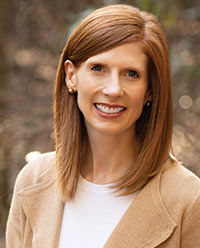 Elizabeth Love became CEO of the Jacob and Terese Hershey Foundation in 2020. Prior to that, she served as Senior Program Officer at Houston Endowment, where she led environmental and health-related initiatives for 11 years. Before joining Houston Endowment, Elizabeth served as Director of Harris County Public Health’s Office of Policy and Planning, overseeing the department’s strategic planning, legislative affairs, community-based assessment processes and outcomes evaluation framework. In the late 1990’s, Elizabeth served as a fellow for the U.S. Centers for Disease Control and Prevention. Elizabeth received a Bachelor of Arts degree from Rice University and a master’s degree from the University of Texas School of Public Health. Elizabeth currently serves on the boards of LINK Houston, Commission Shift and The Funders Network, as well as on the Advisory Board of the School of Social Sciences at Rice University, and is a past president of the Junior League of Houston. Elizabeth received the 2020 Gregg Cook Award for Excellence in Environmental Leadership from the Texas Energy Summit.
Elizabeth Love became CEO of the Jacob and Terese Hershey Foundation in 2020. Prior to that, she served as Senior Program Officer at Houston Endowment, where she led environmental and health-related initiatives for 11 years. Before joining Houston Endowment, Elizabeth served as Director of Harris County Public Health’s Office of Policy and Planning, overseeing the department’s strategic planning, legislative affairs, community-based assessment processes and outcomes evaluation framework. In the late 1990’s, Elizabeth served as a fellow for the U.S. Centers for Disease Control and Prevention. Elizabeth received a Bachelor of Arts degree from Rice University and a master’s degree from the University of Texas School of Public Health. Elizabeth currently serves on the boards of LINK Houston, Commission Shift and The Funders Network, as well as on the Advisory Board of the School of Social Sciences at Rice University, and is a past president of the Junior League of Houston. Elizabeth received the 2020 Gregg Cook Award for Excellence in Environmental Leadership from the Texas Energy Summit.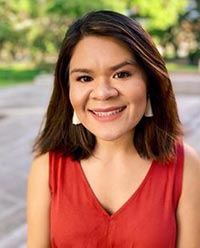 Angelica Razo is the Deputy Director of Campaigns and Programs for Mi Familia Vota, where she oversees efforts to increase political representation and power for the Latinx community through electoral, advocacy and community organizing strategies. Angelica serves on the steering committees for Houston in Action and the Race Equity Leadership and Research Collective; co-chairs the Government Affairs committee for the Coalition for Environment, Equity and Resilience; and serves on the Houston 2036 Environment Task Force. Angelica obtained her B.A. from Rice University, where she remains connected as a Board member for the Society of Latino Alumni, and is a graduate of the Houston Hispanic Chamber of Commerce’s Emerging Leaders Institute. In 2021, Angelica was featured in the inaugural edition of the Houston Chronicle’s “¡Extraordinarios! 10 Houston Latinos who are making a difference.”
Angelica Razo is the Deputy Director of Campaigns and Programs for Mi Familia Vota, where she oversees efforts to increase political representation and power for the Latinx community through electoral, advocacy and community organizing strategies. Angelica serves on the steering committees for Houston in Action and the Race Equity Leadership and Research Collective; co-chairs the Government Affairs committee for the Coalition for Environment, Equity and Resilience; and serves on the Houston 2036 Environment Task Force. Angelica obtained her B.A. from Rice University, where she remains connected as a Board member for the Society of Latino Alumni, and is a graduate of the Houston Hispanic Chamber of Commerce’s Emerging Leaders Institute. In 2021, Angelica was featured in the inaugural edition of the Houston Chronicle’s “¡Extraordinarios! 10 Houston Latinos who are making a difference.”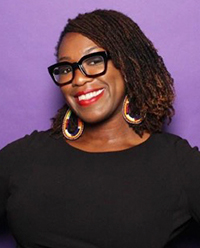 Dr. Kimberly Baker is the Director of the Office of Public Health Practice and Engagement at UTHealth School of Public Health (UTSPH) and serves as an Assistant Professor. Her research interests include reproductive and sexual health, health disparity elimination and the impact of racism on health. She manages We Can Do More, a multi-partner, system-level intervention to increase access to contraception for women in Harris County. She has also developed sexual health interventions informed by community needs targeting males, faith institutions and health providers. She is the co-founder of Full Circle Strategies Consulting Group, a firm that works with agencies across the nation to lessen the impact of racism through strategic planning, training and coaching. She received a Bachelor of Science in Biology from Hampton University, a Master of Public Health from the University of Nevada Las Vegas and her Doctorate of Public Health from UTHealth School of Public Health.
Dr. Kimberly Baker is the Director of the Office of Public Health Practice and Engagement at UTHealth School of Public Health (UTSPH) and serves as an Assistant Professor. Her research interests include reproductive and sexual health, health disparity elimination and the impact of racism on health. She manages We Can Do More, a multi-partner, system-level intervention to increase access to contraception for women in Harris County. She has also developed sexual health interventions informed by community needs targeting males, faith institutions and health providers. She is the co-founder of Full Circle Strategies Consulting Group, a firm that works with agencies across the nation to lessen the impact of racism through strategic planning, training and coaching. She received a Bachelor of Science in Biology from Hampton University, a Master of Public Health from the University of Nevada Las Vegas and her Doctorate of Public Health from UTHealth School of Public Health.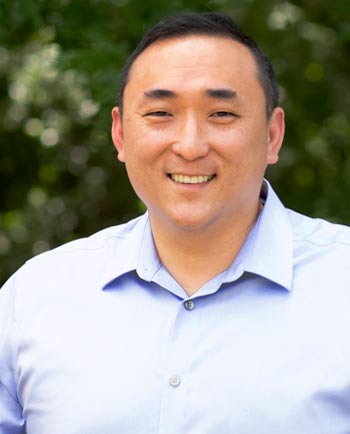 Alan Chang joined the Foundation as Director of Finance in 2023. He previously served for 14 years as Controller at the Albert and Ethel Herzstein Charitable Foundation in Houston, Texas, where he led all aspects of the accounting, finance and investments processes. Prior to that, Alan served as a staff auditor at a local accounting firm, serving nonprofit and private foundation clients. He received his bachelor’s degree in business administration with a concentration in accountancy and taxation from the University of Houston and is a Certified Public Accountant in Texas.
Alan Chang joined the Foundation as Director of Finance in 2023. He previously served for 14 years as Controller at the Albert and Ethel Herzstein Charitable Foundation in Houston, Texas, where he led all aspects of the accounting, finance and investments processes. Prior to that, Alan served as a staff auditor at a local accounting firm, serving nonprofit and private foundation clients. He received his bachelor’s degree in business administration with a concentration in accountancy and taxation from the University of Houston and is a Certified Public Accountant in Texas.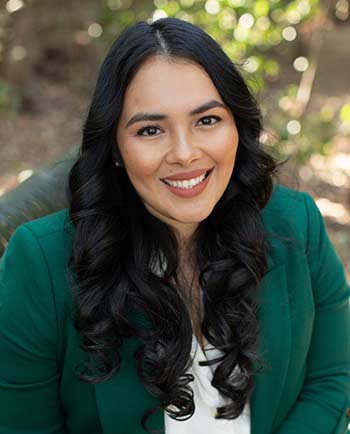 Carolina Salmeron joined the Foundation as Program Officer in 2022. She previously served as Senior Director of Programs for Healthy Futures of Texas, where she led local and statewide initiatives that developed and implemented inclusive, culturally sensitive, and medically accurate sexual education and resources for adolescents and their families. Prior to that, as Program Officer for the Bill and Melinda Gates Institute for Population and Reproductive Health, Carolina led youth programs and partnered with reproductive justice champions around the globe to elevate youth voice and leadership. She received her bachelor’s degree in Biology from Texas A&M University and a master’s degree in Public Health from Johns Hopkins University. Carolina currently serves on the board of MECA, a Houston nonprofit committed to the healthy development of underserved and underrepresented families.
Carolina Salmeron joined the Foundation as Program Officer in 2022. She previously served as Senior Director of Programs for Healthy Futures of Texas, where she led local and statewide initiatives that developed and implemented inclusive, culturally sensitive, and medically accurate sexual education and resources for adolescents and their families. Prior to that, as Program Officer for the Bill and Melinda Gates Institute for Population and Reproductive Health, Carolina led youth programs and partnered with reproductive justice champions around the globe to elevate youth voice and leadership. She received her bachelor’s degree in Biology from Texas A&M University and a master’s degree in Public Health from Johns Hopkins University. Carolina currently serves on the board of MECA, a Houston nonprofit committed to the healthy development of underserved and underrepresented families.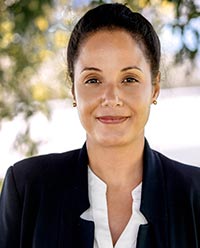 Dr. Bakeyah Nelson is the Principal for Community Health Collaborative Consulting, where she partners with community, nonprofit and philanthropic partners to move environmental justice, climate justice and health equity forward. Bakeyah previously served as an Initiative Director supporting Bloomberg Philanthropies, as Global Initiatives Director for Climate Imperative, as Executive Director of Air Alliance Houston, and in Harris County Public Health’s Office of Policy and Planning, where she led health equity initiatives. Bakeyah serves on the Participatory Working Group for the Hive Fund for Climate and Gender Justice and the Advisory Committee for the Environmental Integrity Project’s Center for Applied Environmental Science. She was a founding member of the New Giving Collective, a giving circle that supports and responds to the needs of the Black community. Bakeyah earned her B.A., M.A., and Ph.D. from the University of Maryland, Baltimore. Bakeyah was named 2020 Clean Air Champion of the Year by the Texas Energy Summit
Dr. Bakeyah Nelson is the Principal for Community Health Collaborative Consulting, where she partners with community, nonprofit and philanthropic partners to move environmental justice, climate justice and health equity forward. Bakeyah previously served as an Initiative Director supporting Bloomberg Philanthropies, as Global Initiatives Director for Climate Imperative, as Executive Director of Air Alliance Houston, and in Harris County Public Health’s Office of Policy and Planning, where she led health equity initiatives. Bakeyah serves on the Participatory Working Group for the Hive Fund for Climate and Gender Justice and the Advisory Committee for the Environmental Integrity Project’s Center for Applied Environmental Science. She was a founding member of the New Giving Collective, a giving circle that supports and responds to the needs of the Black community. Bakeyah earned her B.A., M.A., and Ph.D. from the University of Maryland, Baltimore. Bakeyah was named 2020 Clean Air Champion of the Year by the Texas Energy Summit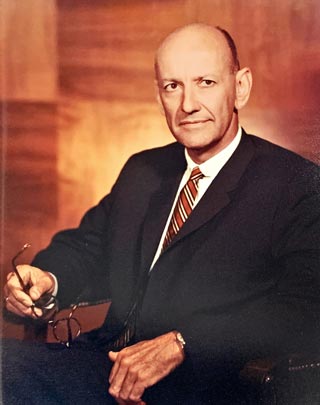 As owner of an inland marine transportation business and former competitive sailor, Jake Hershey was vitally interested in the health of Galveston Bay and area waterways
As owner of an inland marine transportation business and former competitive sailor, Jake Hershey was vitally interested in the health of Galveston Bay and area waterways Terry Hershey began her activist conservation work in the early 1960s when Buffalo Bayou was threatened with channelization as a means to prevent flooding.
Terry Hershey began her activist conservation work in the early 1960s when Buffalo Bayou was threatened with channelization as a means to prevent flooding.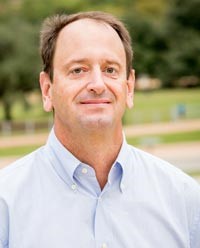 Jeffrey Hershey has been a director on the Foundation’s board since 2001 and has served as its President since 2017. He is the grandson of Jacob Hershey and is the owner and manager of a 2000-acre rice and grain farm in Wharton County Texas. He has worked for the City of Austin Parks and Recreation Department, Stormwater Research Group, Lower Colorado River Authority, Texas Parks and Wildlife Department, and Adjutant Generals Department in various capacities, including as Manager, Natural Resource Specialist, Wildlife Biologist, and Park Specialist. He is a graduate of Fort Lewis College with a degree in Environmental Studies.
Jeffrey Hershey has been a director on the Foundation’s board since 2001 and has served as its President since 2017. He is the grandson of Jacob Hershey and is the owner and manager of a 2000-acre rice and grain farm in Wharton County Texas. He has worked for the City of Austin Parks and Recreation Department, Stormwater Research Group, Lower Colorado River Authority, Texas Parks and Wildlife Department, and Adjutant Generals Department in various capacities, including as Manager, Natural Resource Specialist, Wildlife Biologist, and Park Specialist. He is a graduate of Fort Lewis College with a degree in Environmental Studies. Dr. Andrew Sansom has served on the Foundation Board since 2007. He is one of Texas’ leading conservationists, having served as Executive Director of the Texas Parks and Wildlife Department and Executive Director of the Texas Nature Conservancy. Under his leadership at the Texas Parks and Wildlife Department, Dr. Sansom spearheaded a number of significant programs, including founding the Texas Parks and Wildlife Foundation, which has raised over $150 million for conservation in Texas to date, and adding over 500,000 acres to the State Parks and Wildlife Management Areas. He is a recipient of the Chevron Conservation Award, The Chuck Yeager Award from the National Fish and Wildlife Foundation, The Pugsley Medal from the National Park Foundation, the Seton Award from the International Association of Fish and Wildlife Agencies and the Lifetime Achievement Award from the Nature Conservancy. Dr. Sansom is a Distinguished Alumnus of Austin College and is a graduate of Texas Tech University. His published works have appeared in such publications as Texas Monthly and The Texas Observer and he is the author of eight books, including recent publications Of Texas Rivers and Texas Art and Seasons of Selah. He now serves as Professor of Practice in Geography and is founder of The Meadows Center for Water and the Environment at Texas State University.
Dr. Andrew Sansom has served on the Foundation Board since 2007. He is one of Texas’ leading conservationists, having served as Executive Director of the Texas Parks and Wildlife Department and Executive Director of the Texas Nature Conservancy. Under his leadership at the Texas Parks and Wildlife Department, Dr. Sansom spearheaded a number of significant programs, including founding the Texas Parks and Wildlife Foundation, which has raised over $150 million for conservation in Texas to date, and adding over 500,000 acres to the State Parks and Wildlife Management Areas. He is a recipient of the Chevron Conservation Award, The Chuck Yeager Award from the National Fish and Wildlife Foundation, The Pugsley Medal from the National Park Foundation, the Seton Award from the International Association of Fish and Wildlife Agencies and the Lifetime Achievement Award from the Nature Conservancy. Dr. Sansom is a Distinguished Alumnus of Austin College and is a graduate of Texas Tech University. His published works have appeared in such publications as Texas Monthly and The Texas Observer and he is the author of eight books, including recent publications Of Texas Rivers and Texas Art and Seasons of Selah. He now serves as Professor of Practice in Geography and is founder of The Meadows Center for Water and the Environment at Texas State University.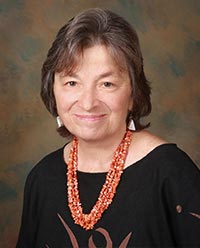 Amie Rodnick has served on the Board of the Foundation since 1995. She is a cousin of Terry Hershey and a practicing attorney in Austin. Amie has served as a past president of Meals on Wheels, the Eanes Education Foundation, Verde Valley School, and as chair of the City of Rollingwood Planning and Zoning Commission. In addition, she has served on the Rollingwood City Council, the board of directors of Jane’s Due Process, Travis County Lawyer Referral Service, and the State Bar Grievance Committee (including as panel chair). She is current president of the Travis County Women Lawyers Association Scholarship Fund, Collaborative Divorce Austin, and the Verde Valley School Foundation. Prior to opening her private practice in Austin, Amie served under Mark White in the Charitable Trusts Section of the Attorney General’s Office. She is a graduate of UT Austin and UT Law and is board certified in family law, a credentialed distinguished mediator, and a Texas Super Lawyer. Her specific interests are reproductive rights and population control.
Amie Rodnick has served on the Board of the Foundation since 1995. She is a cousin of Terry Hershey and a practicing attorney in Austin. Amie has served as a past president of Meals on Wheels, the Eanes Education Foundation, Verde Valley School, and as chair of the City of Rollingwood Planning and Zoning Commission. In addition, she has served on the Rollingwood City Council, the board of directors of Jane’s Due Process, Travis County Lawyer Referral Service, and the State Bar Grievance Committee (including as panel chair). She is current president of the Travis County Women Lawyers Association Scholarship Fund, Collaborative Divorce Austin, and the Verde Valley School Foundation. Prior to opening her private practice in Austin, Amie served under Mark White in the Charitable Trusts Section of the Attorney General’s Office. She is a graduate of UT Austin and UT Law and is board certified in family law, a credentialed distinguished mediator, and a Texas Super Lawyer. Her specific interests are reproductive rights and population control.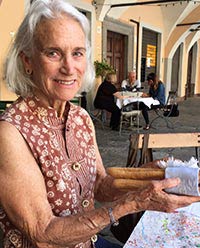 Dr. Olive Hershey, the Foundation’s longest-serving Director, has been a member of The Jacob and Terese Hershey Foundation’s board since 1993. She is the daughter of Jacob Hershey and aunt of Jeffrey Hershey. Before she joined the Foundation Board, Olive was an early member of the Board of Directors of the Sierra Blanca Legal Defense Fund, and currently serves on the Board of Save Buffalo Bayou. She is the author of the novel Truck Dance and is a graduate of the University of Houston creative writing program, where she studied under Donald Barthelme, among others. Her most recent book project Ay, Que Vida!, a biography of Houston artist and activist Gertrude Levy Barnstone, is nearing completion. She has an M.A. and a Ph.D. in American Literature from the University of Texas at Austin. She is very active in Houston environmental issues and works continually to learn of new efforts to improve the air quality in Houston.
Dr. Olive Hershey, the Foundation’s longest-serving Director, has been a member of The Jacob and Terese Hershey Foundation’s board since 1993. She is the daughter of Jacob Hershey and aunt of Jeffrey Hershey. Before she joined the Foundation Board, Olive was an early member of the Board of Directors of the Sierra Blanca Legal Defense Fund, and currently serves on the Board of Save Buffalo Bayou. She is the author of the novel Truck Dance and is a graduate of the University of Houston creative writing program, where she studied under Donald Barthelme, among others. Her most recent book project Ay, Que Vida!, a biography of Houston artist and activist Gertrude Levy Barnstone, is nearing completion. She has an M.A. and a Ph.D. in American Literature from the University of Texas at Austin. She is very active in Houston environmental issues and works continually to learn of new efforts to improve the air quality in Houston.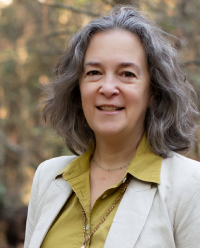 Deborah Mueller, the Foundation’s Director of Operations and Grants Management, has worked on behalf of the Foundation in a variety of capacities for nearly 25 years. She first met Terry and Jake Hershey in 1996 while volunteering for Urban Harvest, an organization that Terry helped to establish. When Terry learned that Deborah was using her computer and organizational skills to help transfer Urban Harvest’s books from a paper-based system to a computer-based one, Terry immediately recruited her to do the same for the Foundation. Deborah has a BA in Art from Rice University, and has spent her career working for both for-profit and non-profit organizations in various management capacities, primarily focused on systems development, project management, and corporate governance.
Deborah Mueller, the Foundation’s Director of Operations and Grants Management, has worked on behalf of the Foundation in a variety of capacities for nearly 25 years. She first met Terry and Jake Hershey in 1996 while volunteering for Urban Harvest, an organization that Terry helped to establish. When Terry learned that Deborah was using her computer and organizational skills to help transfer Urban Harvest’s books from a paper-based system to a computer-based one, Terry immediately recruited her to do the same for the Foundation. Deborah has a BA in Art from Rice University, and has spent her career working for both for-profit and non-profit organizations in various management capacities, primarily focused on systems development, project management, and corporate governance.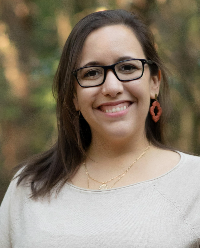 Julia Gutierrez, Executive Assistant, joined the Foundation in 2021 after almost five years at the Houston Zoo. Having worked in both the for-profit and non-profit worlds, Julia brings years of experience in management and administrative roles. A native Houstonian, Julia received a Bachelor of Science from the University of Houston. She maintains a passion for Houston’s native flora and fauna and is an avid fan of the trails along Buffalo Bayou.
Julia Gutierrez, Executive Assistant, joined the Foundation in 2021 after almost five years at the Houston Zoo. Having worked in both the for-profit and non-profit worlds, Julia brings years of experience in management and administrative roles. A native Houstonian, Julia received a Bachelor of Science from the University of Houston. She maintains a passion for Houston’s native flora and fauna and is an avid fan of the trails along Buffalo Bayou.